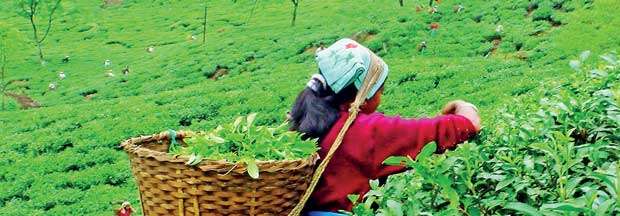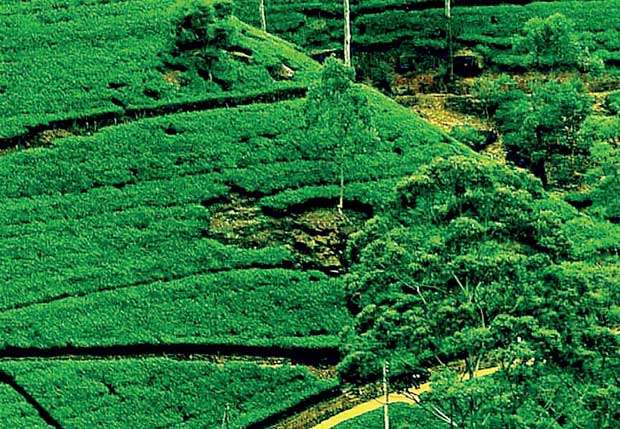Land fragmentation and its fallout Plantations on chopping block ?
Moves are afoot to replace the Land Reform Act of 1972 with a new Act that would release State lands to the open market

 In a Cabinet decision mentioned at a weekly media briefing on December 12 last year, among 35 decisions announced was a proposal that was part of a process that would radically transform the land use patterns on Sri Lanka’s plantations.
In a Cabinet decision mentioned at a weekly media briefing on December 12 last year, among 35 decisions announced was a proposal that was part of a process that would radically transform the land use patterns on Sri Lanka’s plantations.
Under the innocuous-sounding heading ‘Improvement of performance of state plantation companies’ the Ministry of Public Enterprise Development, then under Minister Kabir Hashim, introduced proposals that would lead to the closure of 38 estates in the Kandy, Matale and Nuwara Eliya districts.
Land and workers’ rights activists familiar with the developments say these lands are to be fragmented and offered to private investors for a variety of non-plantation projects such as tourism under PPPs (public-private partnerships).
Among them is Loolkandura Estate (‘Loolecondera’ to the Scots) – Sri Lanka’s first tea estate started in 1867 by Scottish Planter James Taylor, whose picture adorns many tea packs designed for the tourist market.
For the most part, the long-term impact of these changes on the plantations, estate workers and the environment have been obscured to the public eye.
Isolated reports on the PPPs, measures to attract private investors etc., fail to convey the radical nature of changes underway in this restructuring activity. It should be a matter of concern that there has been little transparency on the part of authorities regarding this process, which is in line with IMF and World Bank conditions to which the Government is committed.
“Workers were unaware till recently,” said Buddhi Jayasuriya, Chairman of the LSSP’s Agricultural Committee.
“The Cabinet paper says it was discussed with the trade unions, but workers are in the dark. (It was only) when certain investors visited the estates to get information that they (the workers) discovered it. This was very secretly done.”
Workers from Loolkandura which comes under the Janatha Estates Development Board (JEDB), and from surrounding estates are gathering signatures on a petition to President Maithripala Sirisena demanding a stop to the process that would result in a closure of factories and loss of jobs. About 2,000 have already signed according to Jayasuriya.
With 400 to 500 workers on each estate, several thousands would be affected, he said. The acreage of the targeted estates in the three districts is around 30,000 in his estimation.
He noted that in 1995 when the Government divested shares of the state-owned plantations to the private sector, the entire estates were given, unlike in the process now underway where the estates are being fragmented, with no hope of revival. “The whole idea in giving them to Public Enterprise (ministry) is to fragmentise,” the former general manager of the Sri Lanka State Plantations Corporations (SLSPC) and deputy general manager of JEDB said.
The Cabinet paper says it was discussed with the trade unions, but workers are in the dark. (It was only) when certain investors visited the estates to get information that they (the workers) discovered it. This was very secretly done
In a parallel development, the Government has been building houses on seven perches of land each granted to estate workers, along with title deeds. It would appear this is being done to improve the lives of workers who till now lived in the sub-standard conditions of line-rooms. While there is no denying that the housing conditions of plantation workers were in dire need of upgrading, what the project proponents do not say is, that along with the closure of factories and redistribution of land for private business, a situation could be created where workers have houses but no jobs.
“They might be taken as casual workers … depending on the whim of the employer” Jayasuriya speculates, but worries that they will “lose community and the collective power of the trade unions.” Analysts say the government’s long-term objective in granting freehold land titles is to create assets that can potentially enter the land market, in line with World Bank-driven policy. This could eventually lead to dispossession.
In August last year the Government approved amending the law relating to fragmentation of Tea, Rubber and Coconut plantations, with reports saying the intention was to enable the use of such lands for large scale development projects.
It is not only the plantations but also other smallholders’ agricultural lands that are in the balance under the government’s neo-liberal agenda. Most farmers cultivate small two or three acre plots of state land on some form of lease or permit. The government’s programme of granting title deeds to these lands has been going on apace, and here again, the policy is guided by the World Bank’s thinking that resources like land and water should be treated as traded commodities, and thrown open to market forces. This would make way for investors to consolidate holdings and start large-scale projects. It’s well known that farmers are chronically indebted.
The small-holders, who are pushed off their land - either because they are forced to sell or because lands given as collateral for loans are seized -will, in all likelihood, be driven into the cities where they would form a pool of cheap labour.
The small-holders, who are pushed off their land - either because they are forced to sell or because lands given as collateral for loans are seized -will, in all likelihood, be driven into the cities where they would form a pool of cheap labour.
The poor performance of the state owned plantations was the reason cited by minister Hashim at the time he introduced the Cabinet proposal.
“For decades Governments have been trying to dispose of unproductive estates” Jayasuriya observed.
The question that arises is whether divesting state ownership and fragmenting the lands for private investors is the best route to take with these precious natural resources.
Fragile and sensitive eco-systems of the mid-country plantation areas are at risk, environmentalists argue. The JEDB and SLSPC hold large extents of land that are forests. The destruction resulting from clearing them for various business enterprises will cause significant environmental degradation, they warn.
A large percentage of some of these estates consist of primary forests, not secondary forests, said Sajeewa Chamikara, Environment Consultant at MONLAR (Movement for National Land and Agricultural Reform).
“Natural habitats will be affected, water catchment areas will be affected,” he told the Daily Mirror.
“In the Knuckles, Sri Pada, Rakwana and surrounding areas biodiversity will be affected.” In low country tea-growing areas, secondary forests support streams and catchment areas he noted. Chamikara warns of moves afoot to replace the Land Reform Act of 1972 with a new Land Bank Act that would release state lands to the open market.
At the behest of the World Bank, thousands of acres currently under the Land Reform Commission is to be made available to private investors including foreigners he says, in a MONLAR paper calling for an immediate halt to these reforms.
Laws have already been amended to lift restrictions on foreigners’ access to land. These policies will rob people, and especially small farmers, of the right to land and natural resources for their livelihood he says.
Although the upcoming budget looks set to deliver assorted relief (Sahana) to the people, it seems unlikely that the Government will compromise on its radical policy direction relating to land.
It is too entrapped in conditionality imposed by its external advisors to allow such an assertion of sovereignty, it would seem.
- Proposal to a process to radically transform land-use patterns on Sri Lanka’s plantations
- Fragile and sensitive eco-systems of the mid-country plantation areas are at risk


